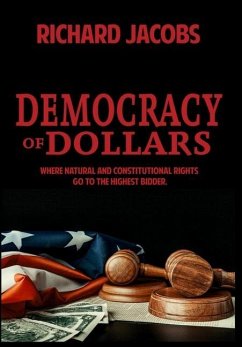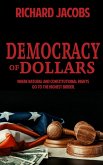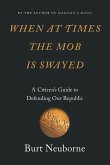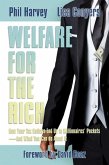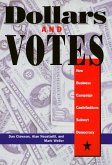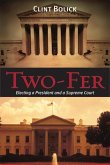"America's Democracy of Dollars is about a "legal" problem we have today in America. But it is not a law book written for lawyers. Nor is it a political book, taking sides with either conservatives or progressives. It is a book written for us Americans, to aid us in understanding a problem that affects each of us so each of us can choose to do something about it. It is also a book about context, not theory. What is the context of our times? As a society, we have morphed from a Democracy of People into a Democracy of Dollars. Two political institutions of our federal government, the Legislative and the Executive Branches, designed to protect and serve all Americans, have become servants to special interests who, in today's pricey politics, have bought their way to the head of the line. But our national government has a co-equal third institution, the Judiciary Branch, the federal judiciary headed by the Supreme Court. The Judiciary Branch is intended by our Constitution's Framers to be independent and non-political - and, most importantly, the Judiciary Branch is intended to provide a check and balance on the other two Branches. However, in today's Democracy of Dollars, that mission has been failing. Our Supreme Court must assume a different role, a role it occupied in the past when times were equally as difficult and uncertain as today's times. What does all this have to do with you and me? We don't vote for federal judges, they're appointed by the President and confirmed by the Senate. However, public influence, over time, has a dynamic effect on the Court. Over time, in response to public outcries, unmet human needs, and changing circumstances, the Court has, among its accomplishments, modernized the definition of cruel and unusual punishment, and, perhaps, in its most shining hour, decided that "separate but equal" education facilities do not provide black children with an equal education. In this book, we illustrate the Democracy of Dollars plight we face through three examples: First, we focus on the Supreme Court's deference through judge-made rules to the two political branches of government, particularly the Executive Branch, the effect of which is to deny too many people their Rights. Then, we focus on the plight of voters whose effectiveness is diluted by partisan gerrymandering. Finally, we focus on the effect of our Legislative Branch's uncontrolled delegation to the Executive Branch, which has resulted in the unfettered growth of our "Fourth Branch" of government, the administrative state, creating the "Era of Presidential Administration," driven by lobbies and special interests and not the will of the People. These examples led to the important conclusion: we each must be involved citizens. America's Democracy of Dollars is a call to action for each of us. We can, and we must influence the return of America to a Democracy of People. That effort requires each of us to pitch in and help"--

